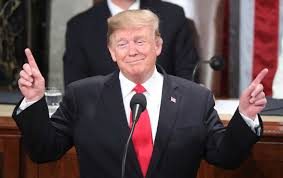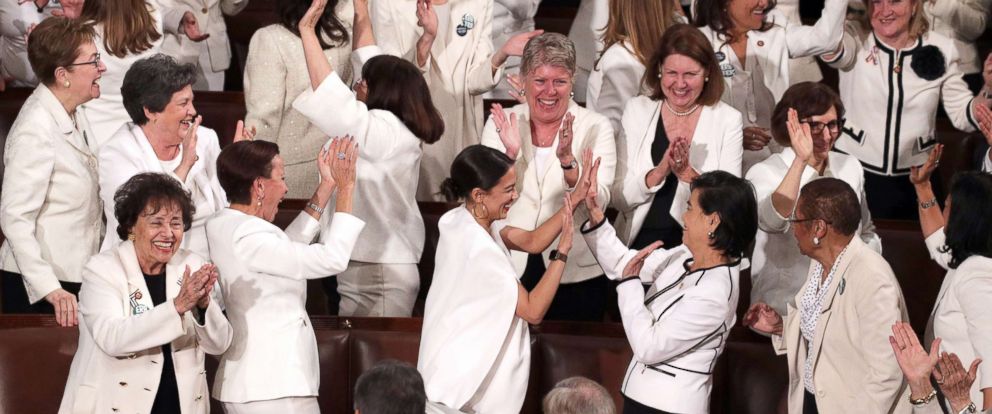
Readers will not have lacked for analyses and comments on President Trump’s State of the Union Message. Nevertheless, some brief thoughts from this corner may be in order. The speech was a uniquely Trumpian tour de force. He began with a solicitous ode to unity and bipartisanship, then abruptly launched into a highly partisan reprise of his familiar rant on illegal immigration at the southern border and the need for the Wall. As usual, his immigration riff, and virtually every subject touched on in the speech, was marked by false and misleading claims and statistics. Fact checkers got off to an early start, but they were given enough material to keep them occupied for days.
It is worth noting that a national security threat at our southern border, described so vividly by Trump, is nowhere mentioned in the Worldwide Threat Assessment issued on January 29 by Dan Coats, Director of National Intelligence on behalf of the intelligence community. The Assessment is a comprehensive catalog of national security threats, existing and potential, so the absence of any reference to caravans or others storming the border was significant.
Turning from immigration, Trump offered an angry protest against “ridiculous, partisan investigations” and defiantly asserted that “If there is going to be peace and legislation, there cannot be war and investigation.” The following morning, Speaker Nancy Pelosi told reporters that she regarded Trump’s assertion as an “all-out threat.” However that may be, it is unlikely that the House will—or should—be deterred from the diligent pursuit of its oversight responsibilities.
The bright spots in Trump’s message were provided almost entirely by periodic introductions of various individuals in the audience, each serving to illustrate a point Trump was trying to make. The honored guests were worthy and sympathetic figures who received and deserved the warm applause of Democrats as well as Republicans while Trump basked in their applause as a collateral beneficiary. One may fairly question whether the use of such human props in a SOTU is appropriate, or has come to be overdone, but their presence did lighten the evening. One other upbeat moment came when Trump referred to the record number of women in Congress (painfully ignoring the fact that very few of them are Republicans). Trump’s comment triggered a lively, almost raucous, celebration among the Democratic women of the House of Representatives—nearly all of them clad in white, the symbolic color of women’s suffrage.

Trump’s aggressive comments on illegal immigrants and the Wall left open the question whether any compromise could be reached by the February 15 deadline. Some observers appeared to sense room for compromise on Trump’s part, but that required a rather optimistic reading of the tea leaves. On the other hand, Speaker Pelosi said on Wednesday that she would endorse any agreement on border security reached by the Conference Committee. That, of course, is how the system should work, and if Trump makes a similar commitment, it will go a long way to resolving this manufactured crisis. Conversely, if Trump rejects an agreement by the Conference Committee, it would place the blame for a further shutdown squarely on his shoulders. (And it would severely undermine any attempt to provide funding by way of a spurious declaration of a national emergency.)
It remains to be seen whether the Conference Committee does reach an agreement and what it provides. My own expectation is that the Committee will agree to include funding in some amount for physical barriers. That expectation is based on the assumption, previously expressed in these pages, that new or improved fencing in some areas would serve a useful purpose. Unfortunately, that is only an assumption, rather than a conclusion based on facts, because facts are virtually impossible to come by. The Conference Committee has now heard directly from the Border Patrol as to the details of their perceived needs. I believe it is highly unusual, perhaps unprecedented, for a conference committee to receive facts not previously presented to either the House or the Senate, but in this case such information was clearly needed. Indeed, it would have been even better if testimony from the Border Patrol had been presented at an open hearing, enabling the public to make its own judgment, but that is not going to happen.
One of the noteworthy aspects of the SOTU was Trump’s failure to mention several important subjects, including the very shutdown to which he had recently subjected the nation and which could soon return. The shutdown had not only produced hardships for 800,000 federal employees but economic damage to many sectors of the economy; it can hardly be denied that such damage, and the prospect of similar or even greater harm if the shutdown resumes, are highly relevant to the state of our union.
Two other major topics left untouched by the President were gun control and climate change. Trump presented a forceful denunciation of anti-semitism and, in that context, spoke of the tragic shooting at the Tree of Life Synagogue in Pittsburgh, introducing from the audience both a survivor and a heroic first responder from that event. Trump’s attack on anti-semitism and his invocation of the outrage in Pittsburgh were entirely appropriate. Unfortunately, however, he passed up the opportunity to make any reference to the scourge of guns in our communities that make such tragedies possible. It may be recalled that after the Parkland shooting, Trump had a televised meeting with Congressional leaders in which he expressed support for gun control legislation; immediately thereafter, however, after being privately rebuked by a representative of the NRA, he beat a hasty retreat. He remains in retreat.
Trump is well-known as a skeptic, if not outright denier, of climate change and the importance of human activity in producing it. Yet his failure even to mention the subject was jarring in view of major statements by others in his administration that he had been unable to suppress. On November 23, 2018, the Fourth National Climate Assessment, a 1,665 page report prepared by 13 federal departments and agencies, gave a detailed and blunt portrayal of the damage that would likely result from unchecked global warming. For example, among several disturbing conclusions: “Without substantial and sustained global mitigation and regional adaptation efforts, climate change is expected to cause growing losses to American infrastructure and property and impede the rate of economic growth over this century.”
Even more recently, the Worldwide Threat Assessment warned of the impact of climate change on national security:
Environment and Climate Change Global environmental and ecological degradation, as well as climate change, are likely to fuel competition for resources, economic distress, and social discontent through 2019 and beyond. Climate hazards such as extreme weather, higher temperatures, droughts, floods, wildfires, storms, sea level rise, soil degradation, and acidifying oceans are intensifying, threatening infrastructure, health, and water and food security. Irreversible damage to ecosystems and habitats will undermine the economic benefits they provide, worsened by air, soil, water, and marine pollution.
Extreme weather events, many worsened by accelerating sea level rise, will particularly affect urban coastal areas in South Asia, Southeast Asia, and the Western Hemisphere. Damage to communication, energy, and transportation infrastructure could affect low-lying military bases, inflict economic costs, and cause human displacement and loss of life.
Yet the Commander in Chief remains willfully oblivious.
Trump’s references to other matters of national security were selective and uniformly shallow. For example, Trump referred glancingly to both Russia and China, but to each in a narrow context, Russia regarding the INF treaty and China regarding trade and tariffs. He did not remotely convey the broad and varied global threats attributed to both countries by the Worldwide Threat Assessment:
At present, China and Russia pose the greatest espionage and cyber attack threats, but we anticipate that all our adversaries and strategic competitors will increasingly build and integrate cyber espionage, attack, and influence capabilities into their efforts to influence US policies and advance their own national security interests.
China and Russia will present a wide variety of economic, political, counterintelligence, military, and diplomatic challenges to the United States and its allies. We anticipate that they will collaborate to counter US objectives, taking advantage of rising doubts in some places about the liberal democratic model.
Both statements are supported by clear and compelling details. In general, Readers wishing to get a more accurate and complete picture of the state of our union in the world are urged to read the Assessment. It is 42 pages long but written in non-technical language and it is vastly more informative than the SOTU. One hopes that the President has read it, but that is by no means certain.

Another superb post. Let’s hope the GOP comes to its senses and offers voters a fine nominee in the next presidential election. All Americans benefit from a heathy two-party system. Neither major party has a monopoly on good ideas. Everyone prospers when our political leaders are well-inforned and work for the conmon good, always putting country first.
Since RINOcracy does good research for his articles, would he research The Donald’s claim that despite withdrawal from the Climate agreement, the United States has reduced carbon dioxide emission more than any country who signed the agreement. Treaties are political so actual results sometimes do not happen, such as the intercontinental missile treaty with Russia who cheated and recently bragged about an unstoppable missile they developed.
US greenhouse gas emissions declined in 2015-2017 but spiked by 2.5 % in 2018. That was in part because of increased economic activity but in -part because of deregulation ordered by the Polluter-in-Chief. At the same time,emissions in the European Union declined by .7% in 2018.
John – It is well established that cabon emissions have increased dramatically in the US in recent years, and that the US is 2d only to China in polluting the atmosphere with carbon emissions. In short, we are a major cause of global warming and the environmental disasters that follow in its wake, including hurricanes, tsunamis, forest fires, drought, and premature disease and death of all living things.
Thanks, Doug, for excellent coverage of the SOTU address. You added some important details that were not presented in major media reports. Overall, the best summary I’ve read.
Doug–Thanks for your usual cogent analysis. I see that you did not discuss Trump’s boast that the only reason we have not had a war with North Korea was his election. At a perverse level, there might be an element to truth to this given that Trump’s hubris has given Kim Jong Un considerable latitude to develop weapons on the sly with no apparent consequences. It is — like many other problems that are not being addressed — a considerable one that, I hope, a newly elected administration in 2020 will give thought and action. Concerning my hope for a new administration, it strikes me as not merely desirable, but likely imperative, that the Democratic party nominate someone sufficiently moderate who is able to capture a significant portion of people who voted for Trump in 2016. In the meantime, we continue to be in for a rough ride.
Robert – I agree but want a great nominnee from the GOP as well so whoever wins, we get a good president. I’d be delighted with a Jerry Ford or Ron Reagan, just as I would with a Joe Biden or Amy Kobachar. The key is to have a very competennt leader with lots of integrity.
Comments are closed.